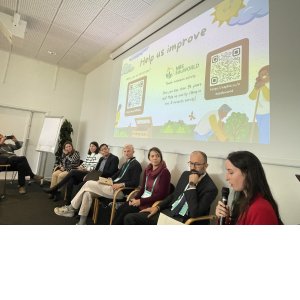
At the Aalborg2024 conference, attended by over 500 city and regional government affiliates, the session titled "Empower Youth, Transform Tomorrow: Unleashing the Power of Youth for Climate Action" focused on amplifying youth voices in climate action. Hosted by Clotilde Mahé, a Communication expert at ICLEI Europe, the 90-minute session began with a role-playing exercise. Participants assumed roles of students, school leaders, and city officials to explore strategies for enhancing youth engagement. The exercise emphasised challenges such as limited decision-making power and the need to foster deeper youth participation.
The session continued with practical solutions for integrating youth into climate action initiatives, aligning with the Aalborg Conditions for inclusive participation. Following the role-play, a panel of speakers representing diverse sectors shared their real-world insights on engaging youth. Speakers included Serkan Yucel from the Turkish Ministry of Youth and Sport, who highlighted challenges in engaging post-pandemic youth, especially refugees. Bjarke Bjoerch-Haderup of the Danish Youth Climate Council stressed the importance of involving younger generations in energy transition debates. Claudia Misteli from The Nature of Cities (and NetworkNature) spoke about creative approaches to social innovation through nature-based solutions. John Warren Tamor from YOUNGO emphasized the need to empower youth with tools for international climate negotiations. Lastly, Susana Campos and Luisa Garcia presented strategies from the Horizon Europe FEAST project, including interactive workshops and food literacy games in schools.
In conclusion, this session highlighted the immense potential of youth as agents of change in the fight against climate change. We’ve identified key challenges such as limited decision-making power and discussed practical solutions to overcome them, from fostering intergenerational dialogue to using creative, participatory approaches. Participants gained valuable insights from our expert panel on how to actively engage young people in diverse sectors, from energy transition to sustainable food systems. Youth inclusion requires commitment from all stakeholders—schools, municipalities, and youth organizations alike. By leveraging the innovative strategies shared today, we can foster deeper youth involvement in climate action.
To support this, the NBS EduWORLD consortium are currently developing a toolkit for youth inclusion, designed to provide concrete tools and guidance for prioritising youth inclusion in NBS education. If you’re aged 18 to 35, take our 2-minute survey to help shape the upcoming youth inclusion toolkit!
